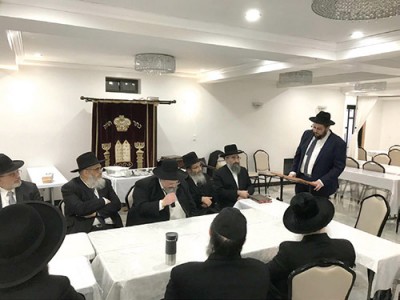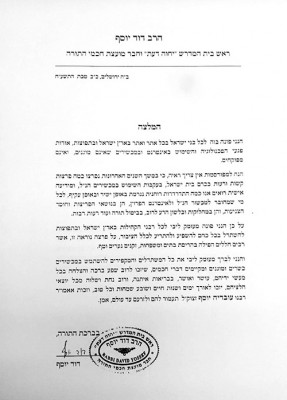





On Tuesday December 11th, Queens Rabbanim representing many diverse communities gathered to discuss a serious threat to the fabric of the Jewish home. So many families and marriages have been destroyed by the abuse of Internet. Even businesses are suffering by the constant temptation for distraction which is eroding work ethic. Tragically, children, too, face irrevocable damage to their mental peace and purity because of exposure to improper content via the internet. The Rabbanim of Queens realize the danger posed by this threat if left unchecked, and therefore agreed to join together to hear what can be done. Many Rabbanim made their way over, including the Bukharian Chief Rav Harav Yisraeli; Rabbi Oelbaum; Rabbi Haimov; Rabbi Welcher; Rabbi Steinberg; Rabbi Tzadka; Rabbi Rubin and Harav Walkin.
Unfortunately, virtually every segment of Jewish society faces this same test with the internet: how do you separate the good from the bad without taking risks? The most basic answer is the use of an internet ‘filter’. However, most filters utilize a usually inadequate ‘white list’ and ‘black list’ system which works as follows: The black list is a list of presorted websites and content which are selected by the filter provider and deemed inappropriate. The white list is a list of content and websites which are scanned and deemed appropriate.
Because there are an ever-increasing amount of websites and webpages, it remains a real challenge to efficiently sort them into the proper ‘list’. This creates the situation where important and appropriate material may be blocked, while inappropriate material may slip through. This is a real problem for businessmen, professionals, and employees who rely on immediate access to many webpages and services for their work. It is also an obvious problem for families which wish to safeguard the home from inappropriate and destructive material.
Another issue which was discussed is that many different communities have different perceptions of what is inappropriate and what is acceptable. Some communities restrict videos altogether, while others feel that websites like YouTube are fine. The borough of Queens is known for its diversity, and its Jewish community is no different. It will be a real feat to create a filter which can cater to all of the varying communities. Furthermore, the system will also need to easily adapt to a changing technology, and also be user friendly and efficient.
The final issue raised was that of mixed content websites. Some websites display content which is deemed acceptable, yet the advertisements on the same page are sometimes inappropriate. Again, many such webpages are necessary because of their crucial content, and so it remains a challenge to find a filter which can solve this problem. All of the above issues were discussed, analyzed and weighed during this meeting. Many solutions for these issues were addressed, and the community should stay tuned for further developments.
Queens Rabbanim Gather to Address Internet Abuse
Typography
- Smaller Small Medium Big Bigger
- Default Helvetica Segoe Georgia Times
- Reading Mode


